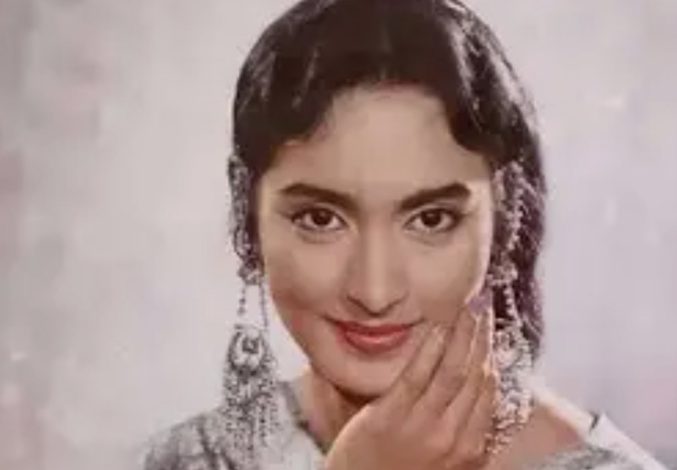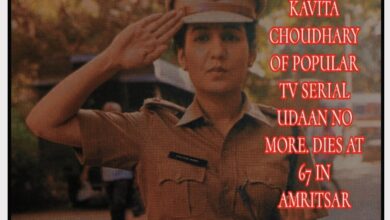The Girl Next Door – Remembering Nutan (4 June 1936-21 February 1999)

Consummate artiste that she was, Nutan went effortlessly from the bubbling teenager, to the tragic queen-enacting the whole gamut of roles with panache. She has left a void that will remain unfilled for quite some time, says SURESH NAUTIYAL
WHILE thinking about Nutan and painting her large image of hundred plus films on a small canvas, I recollect eminent Russian writer Ivan Turgenev’s female character Liza Lenochka in the novel Home of the Gentry saying to the protagonist Fyodor Ivanych Lavretsky, “Fyodor lvanych, you may be walking now beside me but already you are so far, far away from me…”
I wish Turgenev could have spoken through Liza that Fyodor Ivanych, you would be walking beside me for ever and ever, and even when you’re no more.
Turgenev did not write this but I say this about Nutan who was silky sweet, docile, introvert, intelligent, bonny and lissome-featured being, and actress par excellence with strikingly emotive face and deep expressive eyes.
Nutan, who dies in Mumbai of breast cancer on 21 February 1999, is truly regarded as one of the greatest actors of Indian cinema. She is remembered for her willingness to play unconventional roles and several of her roles were labelled path-breaking.
In 2011, Rediff.com listed her as the third-greatest actress of all-time after Nargis and Smita Patil. In 2012, Nutan was placed 10th by the NDTV in its “The Most Popular Actresses of All Time” list. In 2022, she was placed in Outlook India’s 75 Best Bollywood Actresses list. The Times of India placed her in their “50 Beautiful Faces” list. And in 2023, journalist Rajeev Masand named her one of Hindi cinema’s best actresses of all time.
On her performance in Bandini in 1963, Forbes India wrote, “Nutan goes through all the phases of a girl struck by love – the first flush when colour comes to her cheeks upon the mere mention of name, the happiness she feels while playing his pretend-wife. Nutan looks maddened with grief and hatred when she does the acts most foul. Her inner struggle as she reflects between choosing her first love and old is perhaps one the best scenes ever filmed.”
Bimal Roy’s socio-realist film Bandini is based on Tamasi, a Bengali novel by Jarasandha, and stars Nutan as Kalyani, a young prisoner convicted for poisoning the wife of her lover Ashok Kumar. The story follows her life in prison and how she is later faced with a choice between her past love and a young prison doctor Dharmendra, who falls in love with her. Bandini was a major critical success, and Nutan received career-best reviews for her portrayal, which is often cited as one of the finest performances of Indian cinema. The film won six awards at the 11th Filmfare Awards, including the Best Film award and a Best Actress award for Nutan.
The bubbling memories of her innocent and homely face will continue to haunt the minds of those who admired this girl next door for her mature acting talent. Bandini is perhaps Nutan’s best role ever.
And, the list is endless.
Nutan was born in Bombay on 4 June 1936. Actress mother Shobhana Samarth and father poet and director Kumar Sen Samarth inculcated in her interest for dance and art since the beginning. She also went to Switzerland for schooling.
Nutan was the last pillar of a citadel of galaxies and with her death the golden chapter of Indian cinema when emotive actresses ruled the silver screen and the hearts of million with the strength of powerful and sensuous acting was closed.
In fact, the deaths of Madhubala, Meena Kumari, Nargis and Nutan and Smita Patil are unwritten and incomplete tragic screenplays of our cinema.
When only two-and-a-half, years old she gave her first dance recital at the Taj Mahal Hotel in Mumbai, then Bombay. Later, she was given a small role in the film, Nal-Damyanti in 1945 for the first time, which was directed by her father. Two years later she was on the stage, and at 14, was crowned Miss India. A year after she was cast in Humlog opposite Balraj Sahni, produced and directed by her mother. This film was a clinker.
So, her actual career in the films began at the age of 14 when she acted in Hamari Beti (1950-51), a home production directed by her mother Shobhana Samarth. After this, she never looked back, and acted with the veteran actors like Ashok Kumar, Dharmendra and Amitabh Bachchan.
Nutan, in fact, competed with actresses like Nargis, Meena Kumari, Waheeda Rehman, Asha Parekh and Vyjayanthimala on the strength of her talent. Unfortunately, she was not recognised because she never looked sensuous like her contemporary heroines. But the audience always found it easy to identify itself with the characters she portrayed. She was indeed a versatile actress emoting great human values. Her name was not connected with her co-stars. She was in fact Mrs Clean in not so clean Bollywood and gave dignity to a profession much maligned. Also, she created a niche in the hearts of her admires.
Forgetfulness is the greatest gift bestowed upon humanity and time the biggest healer. Nutan knew and understood this essence of life and perhaps she knew that her days were numbered. She, therefore, made every effort to maintain happiness in the family, and fought the deadly disease of cancer quietly and bravely.
Some of her movies read like a roster of Hindi filmdom’s finest flowering. Humlog with Balraj Sahani; Prabhat with Premnath; Laila Majnu with Shammi Kapoor; Shabab with Bharat Bhusan; Seema with Balraj Sahani; Anari, Dil Hi To Hai, Chhalia, Kanhaiya, with Raj Kapoor; Paying Guest, Manzil, Tere Ghar Ke Samne, Dili Ka Thug with Kishore Kumar; and, many more. Sujata was among her best films.
Nutan married Navy officer Lieutenant-Commander Rajnish Bahl on 11 October 1959. Their only son Mohnish Bahl, was born on 14 August 1961, who is an established television and film actor.
In the 1980s, Nutan started playing character roles and continued working until shortly before her death on 21 February 1999.
Two of her films Naseebwala (1992) and Insaniyat (1994) were released after her death. She also gave a stellar performance as Kaliganj Ki Bahu in the TV serial Muzrim Hazir, her only role on the small screen. Nutan also sang two songs, one in Paying Guest and the other in Chhabili.
She was a hardworking professional and a quick-learner. Directors like Hrishikesh Mukherjee compared her to legendary Meena Kumari. For millions of people Nutan remained an artiste extraordinaire and a fine person.
In Ashok Kumar’s words she was a class artiste and Dev Anand termed her a sensitive class artist. Her faith in human emotions enabled her putting subtle emotion on the screen, an ability which most of the heroines lack. She aimed at perfection in every sphere of life. Finer things fascinated her and Nargis was among them.
She had the ability to make the most complex and intense of roles look simple ones. This quality sometimes came like a hinderance before her career because the audience took her for a ride believing she was not acting at all.
Her dedication for acting also won her a national award for Kasturi. She used to think a role through not only like an artiste but also as a technician. She won the Filmfare Award for the best actress for several times and twice for character roles. She thus became a record holder in the category, and at age 42, she was the oldest winner of the award. Nutan was perhaps the only actress of her generation to command leading roles in her 40s, with tremendous success. Besides, she also bagged the Best Actress Award at the Karlovy Vary Festival.
Filmfare termed her face “camera-friendly” and said, “Apart from a lissome figure Nutan was gifted with one of the most camera-friendly faces in the industry. One could film her from any angle and it came out perfect.” Actresses such as Sadhana and Smita Patil noted Nutan as their influence.
In a nutshell, Nutan lent a certain emotive appeal to the portrayal of the suffering women. Her films portray the evolution of Indian woman from a shy and unassuming workhorse, exploited mercilessly by male dominated society to a free and economically independent individual, an assertive identity conscious of her rights.
Yes, she was lovable girl living next door – a nonpareil actor!
The writer is a senior journalist and formerly Consulting editor UNI





